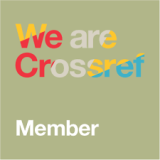Analisis Ekonomi Kelembagaan Keuangan Masyarakat: Studi Modal Sosial Dan Dinamika Pendapatan Dalam Prespektif Ekonomi Syariah
Abstract
Institutional economic analysis is one of the important studies in modern economics, especially in assessing the relationship of social capital and income dynamics as a construct variable in the perspective of Islamic economics. The study uses a systematic literature review approach originating from accredited journals, the data reduction process is carried out by structuring exogenous research topics in mapping literature that is closely related to the problem unit. The results of the study provide information that networks, norms, trust, reciprocity are the identified factors that are dominant in constructing social capital factors and income dynamics towards institutional economics, especially in the Islamic economic perspective, the aspect of shared value is the dominant factor which is known to originate from public trust in religious values. from sharia-compliant financial institutions. Another finding is that most of the research is dominated by institutional economic perspectives, social capital and income dynamics are interrelated and influence each other and this also happens within the Islamic economic framework. Strong and quality social capital can affect the dynamics of income in society, which is agreed by most of the previous research has a significant positive impact on economic development.
Keywords
Full Text:
PDFReferences
Afif, S. W., & Darwanto. (2017). Tata Kelola Baitul Maal Wa Tamwil (Bmt) Berbasis Prinsip 6c Dan Modal Sosial : Studi Pada Bmt Mekar Da'wah. al-Uqud: Journal of Islamic Economics, 121-138.
Al-Bukhari, A. (2011). Ensiklopedia Hadits; Shahih al-Bukhari 1, Terj. Masyhar dan Muhammad Suhadi. Jakarta: Almahira.
Arif, M. N. (2012). Lembaga Keuangan Syariah: Suatu Kajian Teoritis Praktis. Bandung: Pustaka Setia.
Ash Shobuni, M. (1997). Tafsir Ibni Katsir. Kairo: Dar Ash Shobuni.
Bungin, M. B. (2009). Metodologi Penelitian Kuantitatif: Komunikasi, Ekonomi, Dan Kebijakan Publik Serta Ilmu-Ilmu Sosial Lainnya. Jakarta: Kencana.
Dharma, B., Putri, L., & Sepfiani, P. (2023). Studi Literatur Pemahaman Laporankeuangan Terhadap Kepengurusan Masjid. Jkpim: Jurnal Kajian dan Penalaran Ilmu Manajemen, 1-10.
Dharma, B., Syarbaini, A. M., Rahmah, M., & Hasby, M. (2023). Enhancing Literacy and Management of Productive Waqf at BKM AlMukhlisin Towards a Mosque as a Center for Community Worship and Economics. ABDIMAS: Jurnal Pengabdian Masyarakat.
Fathy, R. (2019). Modal Sosial: Konsep, Inklusifitas Dan Pemberdayaan Masyarakat. SOSIOGLOBAL: Jurnal Pemikiran dan Penelitian Sosiologi, 35-53.
Furbey, Robert et al. (2006). Faith as social capital. Sheffield: Sheffield Hallam University.
Hasbullah , J. (2006). Social Capital: Menuju Keunggulan Budaya Manusia Indonesia. Jakarta: MR- United Press.
Iskandar, A., Possumah, B. T., & Aqbar, K. (2020). Peran Ekonomi dan Keuangan Sosial Islam Saat Pandemi Covid-19. SALAM; Jurnal Sosial & Budaya Syar-i, 625-637.
Kafabih, A. (2018). Analisis Peran Modal Sosial Badan Usaha Milik Desa (Bum Desa) terhadap Pengentasan Kemiskinan. OECONOMICUS Journal of Economics, 51-70.
Kara, M. (2012). Pemikiran Al-Syatibi Tentang Maslahah dan Implementasinya Dalam Pengembangan Ekonomi Syariah. ASSETS, Vol. 2 No. 2, 2012: , 173- 184.
Kearns, A. (2004). Social Capital, Regeneration & Urban Policy. CNR PaperVol.15, 1-39.
Kurniasih, W. (2015). Analisis Ekonomi Kelembagaan Koperasi Nelayan (KUD) Di Kabupaten Situbondo: Studi Modal Sosial dan DInamika Pendapatan Nelayan. Jember: Universitas Jember.
Mahendra, S. (2015). Keterkaitan Modal Sosial Dengan Strategi Kelangsungan Usaha Pedagang Sektor Informal Di Kawasan Waduk Mulur: Studi Kasus Pada Pedagang Sektor Informal Di Kawasan Waduk Mulur Kelurahan Mulur Kecamatan Bendosari Kabupaten Sukoharjo. Jurnal Analisa Sosiologi, 10-30.
Marliyah, Yafiz, M., Dharma, B., & Syarbaini, A. M. (2022). 'Amid: Islamic Integrative Approach as Survey Model. Indonesian Journal of Islamic Literature and Muslim Society.
Moallemi, E., Bertone, E., Eker, S., Gao, L., Szetey, K., Taylor, N., & Bryan, B. (2021). A review of systems modelling for sustainability. doi:10.31223/X54W5H
Nasution, A. F., Lubis, F. A., & Jannah, N. (2023). Analisis Faktor-Faktor Yang Menurunkan Pendapatan Pedagang Pasar Tradisional Petisah Kota Medan. Jurnal Pendidikan Tambusai.
Nguyen, L. K., Kumar, C., Jiang, B., & Zimmermann, N. (2023). Implementation of Systems Thinking in Public Policy: A Systematic Review. Systems, 11(2). doi:10.3390/systems11020064
Pusparini, D. M. (2015). Konsep Kesejahteraan Dalam Ekonomi Islam: Perspektif Maqasid Asy-Syari‟ah. Jurnal UII Yogyakarta, Vol.1 No.1, 45-59.
Rahmawati, l. (2012). Maliyah. Vol.2, No. 1, 329-341.
Saher, S. A., & Zaki, I. (2018). Peran Modal Sosial Dalam Meningkatkan Kesejahteraan Keluarga Perspektif Maqashid Syariah (Studi Kasus Yayasan Rombong Sedekah Jombang). Jurnal Ekonomi Syariah Teori dan Terapan, 49-62.
Sanrego, Y. D., & Taufiq, M. (2016). Fiqih Tamkin (Fikih Pemberdayaan). Jakarta: Qisthi Press.
Saputra, R. S., & Dewi, A. S. (2017). Peran Modal Sosial Sebagai Mediator Literasi Keuangan Dan Inklusi Keuangan Pada Kaum Muda Di Indonesia (Studi Kasus Pada Komunitas Investor Saham Pemula). Jurnal Manajemen Teori dan Terapan, 243-257.
Siisiäinen, M. (2000). Two Concepts of Social Capital: Capital: Bourdieu vs Putnam. Konferensi Internasional ISTR yang keempat "The Third Sector: For What and for Whom?". Dublin, Ireland: Trinity College .
Solekha, Y. A., Murdianah, A. Q., Lestari, N. S., & Asytuti, R. (2021). Baitul Maal Wa Tamwil Sebagai Lembaga Keuangan Mikro Syariah Pemberdaya Ekonomi Umat (Konsep dan Teori). Velocity: Journal of Sharia Finance and Banking.
Sugiyono. (2016). Metodologi Penelitian Manajemen. Bandung: Alfabeta.
Syahra, R. (2003). Modal Sosial: Konsep dan Aplikasi. Jurnal Masyarakat dan Budaya, 1-20.
Thobias, E. (2013). Pengaruh Modal Sosial Terhadap Perilaku Kewirausahaan (Suatu Studi Pada Pelaku Usaha Mikro Kecil Menengah Di Kecamatan Kabaruan Kabupaten Kepulauan Talaud). ACTA DIURNA KOMUNIKASI.
Trisnanto, T. B., Fatih, C., & Fitriani. (2017). Membangun Modal Sosial pada Gabungan Kelompok Tani. Masyarakat, Kebudayaan dan Politik, 59-67.
Vogel, F. E., & Hayes, S. L. (2007). Hukum Keuangan Islam, Konsep, Teori dan Praktek, Terj. M. Sobirin Ashnawi dkk). Yogyakarta: Nusamedia.
Warda, N., Elmira, E., & Rizky, M. (2018). Dinamika Ketimpangan dan Penghidupan di Perdesaan Indonesia, 2006-2016. The SMERU Research Institute.
DOI: http://dx.doi.org/10.30829/ajei.v8i1.15447
Refbacks
- There are currently no refbacks.
Copyright (c) 2023 Fauzi Arif Lubis

This work is licensed under a Creative Commons Attribution-ShareAlike 4.0 International License.





3.jpg)






